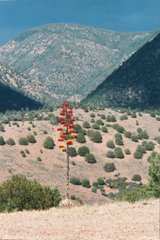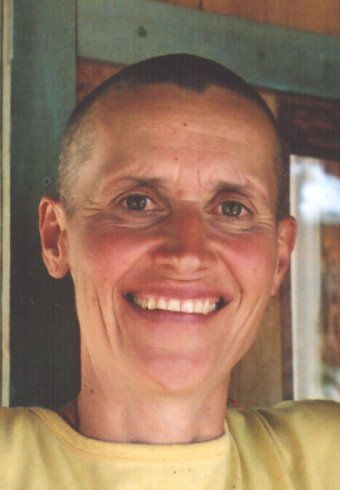
I can tend to be serious, to weigh each moment for its impact or purpose, to contemplate rather than just be, and in so doing, hindering the presence of spontaneity. Not always, of course - i can laugh and tell jokes and float with the swell of simple joy. But I am a Capricorn, and it is true to say that my habits fall on the serious side. I can be worried and rigid and disciplined to the point where the world is so solid i will trip on it.
This has its ups and downs as a practitioner. When i first met this Path with my heart, I was driven by a deep passion to engage. The beginning of our foundational practice, Ngondro, involves 100,000 full length prostrations, through which your mind can soften (and body become healthy!). It is an arduous, yet so precious experience, and i was determined to do it. Most every day I came home from my part-time job and went to my practice room, with small altar, and, despite the heat of a central Australian summer, would do prostration after prostration into the hundreds, until the sweat poured. I truly had a single-pointed focus to get through, to move on: because I knew this was a foundation I needed in order to even begin the journey i was embarking on. Diligence and discipline were my stave; nothing was going to interfere. And for this I am grateful.
Yet, a few years ago, while living out here, I began to understand that too much can become a cumbersome weight, preventing movement. Discipline can become fixed rigidity, and that is something this path is not. It is fluid, flexible - which is not the same as sloppy or lame. But each moment contains the potential for anything, everything: is bursting with energy and awareness. Is alive. You can't box it in or nail it down, you have to surrender and allow it to awaken.
I was reminded of this by Tia - whom I have never met, and yet our lives have intersected, creating the space for the exchange of friendship. She wrote of the need for more whimsy in her life, and described herself as "She who yearns to dance", with joy and light. This prompted me to turn to one of my favorite books "Magic Dance, The Display of the Self-nature of the five Wisdom Dakinis" by the loved and revered teacher, Thinley Norbu Rinpoche. Rinpoche's writing is exquisite, arising from Wisdom Mind; it is poetry beyond words, as he describes the indescribable, in ways that tease your mind. Evocative and elusive, like rainbow-hued drops of a waterfall, I have read and re-read this book line by line, and still its true meaning evades me, although I know it is there on every page, in every syllable. Whether the book is open, or closed.
There is a chapter titled "Playmind" in which Rinpoche explains to us, "So whatever our practice is, we need playmind, which is always unexpecting and vast. Playmind has no fear because it has no object. Because it is completely natural and open, it always gives bliss and blessing." He also says, "Many teachers and texts say that we must be serious and diligent in our practice. But serious diligence does not mean only strict and narrow discipline. If we separate diligence from open space, it is the course of ignorance. Real diligence is always the continuous energy of open playmind."
Its a fine line to walk, for me - to learn diligence is not the same as rigidity, yet to honour the sacredness of the commitments I have made. To allow the breath of joy to infuse my prayers, my days, my intention, and not stay fixed on "am i doing it well enough, or right, or because i have to" or whatever else drags me away from the essence that is the true nourishment.
We are taught of the four immeasurable qualities that are always within our hearts. Loving-kindness, compassion, equanimity. And joy. Qualities that reach beyond the ends of space, and yet are contained within the very cells of our bodies. We have all tasted them in our lives, they are familiar to us in an intimate way. Yet sometimes, for me, it is easier to focus on the first three: to try and be kinder, to evoke compassion for others, to work at embracing that all beings are equal. And to neglect joy, the deep and quiet stream that the first three arise from, and also create.
Of course there is no first and last - they are, after all, immeasurable and vast: different colours reflecting from the very same source. Yet for me, with my sackful of habits I drag through each day, it seems as though joy is the fabric on which the others are woven. It is the blush of sunrise from which the mountains are etched. It is always there, present, but I get stiff and worried, and so easily forget. To taste it, breathe it, be it. Let it erupt and spill out,
The photo for the post was sent to me recently by my dear friend Mary; when I saw it I laughed! Who knows what my scrunched up face is saying to her as she takes this photo of me and her patient husband, Tom. But there I stand for eternity, clothes crooked, arm on hips, like the country-girl i guess i now am. And in the background the spacious majesty of the mountains and sky that cradle this, my blessed home. It is always like this, in a way - we appear in different guises, different emotions, different weathers, some of which we label good, others bad. But there we are, in that moment. Yet if we look around, and within, we can recognise something more - the beauty and vastness and simplicity from which we arise. It is the background, and it is our hearts - inseparable. And if we allow ourselves to look deeply, we will know that well-spring of joy, from which we can always drink.
.JPG)


